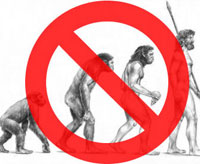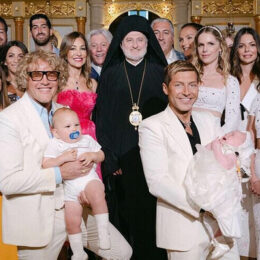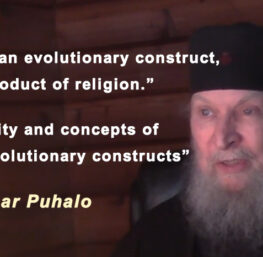 9/12/2010 – F. K. Bartels –
9/12/2010 – F. K. Bartels –
Traditional textbook discussions of ancestral descent are ‘a festering mass of unsupported assertions’.
A recent study conducted by Ph.D student Sarda Sahney, et al., at the University of Bristol, published in Biology Letters, used fossil evidence as a basis for analyzing evolutionary patterns over 400 million years of history. Sarda Sahney and colleagues posit that the availability of “living space” rather than competition for survival — as Darwin proposed — is the governing factor behind the evolution of species. Their theory is based on the concept that the process of evolution in which an organism is involved is highly influenced by its “ecological niche,” which includes such factors as food resources and habitat conditions. According to the study, large evolutionary changes occur in animals as a result of their migration into living spaces which are unoccupied by other animals.
Former president of Gonzaga University and noted scholar Fr. Robert Spitzer confirmed that “Darwin assumed that competition was what was driving the development of human species and particularly the dominance of one species over another.” Fr. Spitzer pointed out that “there is no way of reaching back in time and finding empirical evidence of that fact.”
Fr. Spitzer observed that “Darwin’s theories are based on a series of inferences, which are rooted in genetics, fossil evidence, empirical evidence and even mere conjecture.”
Although the above mentioned study is not directly related to a discussion of the origin of man, the topic of evolution often raises questions in the minds of believers. In a culture which often attempts to stamp out God’s revealed truth, replacing it with dozens or even hundreds of suppositions concerning the origin of the created universe and the life within it, it is both necessary and helpful to familiarize one’s self with the teaching of the Church God willed should exist — the Catholic Church — on the subject of man’s origin.
The Evolution Debate Among Scientists
While evolution is often taken by some as an hypothesis proven beyond doubt, the scientific debate over the theory is one which, due to lack of empirical evidence, shows little if any signs of subsiding. John Bonner, a biologist at Princeton, writes that traditional textbook discussions of ancestral descent are “a festering mass of unsupported assertions.”
George Sim Johnston, author of Apes “R” Not Us: Catholics & the Debate Over Evolution, observed that “the two most famous figures in hominid paleontology, Richard Leakey and Donald Johansen (discoverer of “Lucy”) are in complete disagreement over man’s ancestry.”
In light of the controversy over evolution, it is important to possess a sound understanding of Church teaching concerning the origin of man, for there are some aspects of the theory of evolution which intrude upon Catholic doctrine, and, as a result, can be the cause of serious errors in understanding. Although the Church herself is, of course, not directly involved in scientific study, she nevertheless is the authoritative transmitter of God’s revelation, and therefore provides the faithful with the certainty of God’s revealed truth as it relates to the origin of humankind.
It is also worth noting that many think discussions of man’s origin began with Charles Darwin, whose writings on the subject did raise quite a stir; yet for the Church the issue is an old one, dealt with many times over the course of history.
A Brief Examination Of The Concepts Involved In The Theory Of Evolution
Evolution can be simply defined as a theory which posits that something was or is in a state of necessary development. We can see evidence of this type of evolutionary action all around us. However, the word “evolution” is often used today in a variety of ways, and can have numerous meanings to as many people. Therefore when we speak of the theory of evolution as it relates to man’s origin it is necessary to narrow our definition in order to prevent ambiguity, misunderstanding, and errors which result from sweeping statements.
Materialistic evolution — is a theory which assumes the eternal existence of uncreated matter, and posits that all living creatures emerged from it through a process of evolution. Such a theory is incompatible with God’s revealed truth, for we know that God indeed created the material universe and all the matter within it from nothing. The notion that uncreated matter exists without a point of beginning, uncaused and without origin, stretching infinitely into the past is pure nonsense.
Evolutionism is a theory which posits that everything in the universe, including the spirit or soul, is explained by a development from lower to higher orders, or from simple to complex. Evolutionism holds that the human soul is the result of a natural process of development over eons. Again, such a theory is contrary to God’s revealed truth. The Church teaches that each soul is immediately created by God out of nothing. The notion that the spiritual and immaterial human soul evolved from a material substance is entirely incorrect.
Theistic Evolution is a branch of evolution theory which is compatible with the Christian religion so long as it includes these two qualifications: 1) God’s special divine providence is involved in the creation of the human body; and 2) the separate and immediate creation of each human soul by God.
Rev. Francis Spirago reminds the faithful that, in accordance with the teaching of Pope Pius XII in Humani Generis, the “Church does not forbid the theory of evolution, for Catholic faith only obliges us to hold that the human soul is immediately created by God. However, one cannot go too far and act as if the origin of the human body from pre-existing and living matter were already fully demonstrated by the facts discovered up to now, as if there nothing in the sources of divine revelation that demand great reserve and caution in this controversy” (The Catechism Explained, ch. 5).
Pius XII insisted that regardless of the amount of research completed on the topic of evolution, Catholics must believe that 1) by virtue of man’s human soul, he is essentially superior to the animals; 2) the first woman was derived in some way from the first man; 3) it is impossible that the immediate father of man could have been anything other than a human being; that is, it is impossible that the first man was the son of an animal.
The First Human Beings That God Created Were Adam And Eve
Rev. Spirago explains: “The Church, through the Biblical Commission, requires us to believe in the special creation of Adam, that is, we must believe that Adam came into being through no merely natural process, but through some special intervention by God. God creates every human soul immediately out of nothing. The Church also teaches that God, by a special act, formed the body of Eve from the body of Adam” (Ibid).
Further, there are some who think that a population of humanoids evolved on the surface of the earth, and that the human race descended from that group. In other words, there is the incorrect notion that all human beings are not the descendants of one human pair (Adam and Eve). This theory is known as polygenism, and is contrary to the official teaching of the Magisterium.
Pope Pius XII declared: “it is unintelligible how such an opinion can be squared with what the sources of revealed truth and the documents of the Magisterium of the Church teach on Original Sin, which proceeds from sin actually committed by an individual Adam, and which, passed on to all by way of generation, is in everyone as his own” (HG, 38).
HT: Catholic Online



